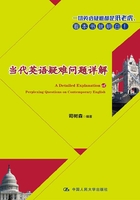
4 以-able和-ible结尾的形容词作定语既可前置也可后置
问:我曾看到这样的说法,“以-able和-ible结尾的形容词可置于前有最高级形容词或only等词的名词之后。”并举例有:
(1)He is the best person available.
(2)This is the best possible answer.
后来我又看到这样一道习题:
(3)To my knowledge he is not .
A. a person unreasonable
B. a reasonable person
答案是A。我的问题是,以-able和-ible结尾的形容词作定语时,究竟应置于名词前,还是置于名词之后?
答:以-able和-ible结尾的形容词用作定语时,既可置于所修饰的名词之前,也可置于名词之后。但有几点应该注意:第一,有些以-able或-ible结尾的形容词用作定语,既可前置也可后置,其意义基本相同,没有区别。例如:
(4)There was no ambulance available.(与…available ambulance同义)
(5)This is the finest obtainable cloth.(与…the finest cloth obtainable同义)
第二,有些以-able或-ible结尾的形容词用作定语时,既可前置也可后置,但意义有所不同;前置时多表示相对持久或永久性的特征。例如:
(6)Venus is a clearly visible star.(You can always see it clearly.)
(7)This is a swift unfordable river.
(8)How can the working class win the valuable support of all these section of the people?
而后置时则多具有临时或短暂的意义。例如:
(9)It is the only star visible now.(It is the only star you can see now.)
(10)This is a narrow river navigable.
你所引述的句(1)和句(2)也可改写成:
(11)He is the best available person.
(12)This is the best answer possible.
(但句(2)更为常见)第三,以-able或-ible结尾的形容词用作定语时,后置比前置时的语气较强,强化该形容词的意义。例如:
(13)Are there any tickets available?(比…any available tickets语气强)
(14)I’d like to speak to the person responsible.(比…to the responsible person语气强)
最后,以-able或-ible结尾的形容词用作定语时,其所修饰的名词前若有最高级形容词或only、every、all等修饰语时,通常须后置。例如:
(15)That is the only solution workable.
应该记住,imaginable“可以(被)想象得到的”,含有被动意义,通常要后置。例如:
(16)He is the most suitable person imaginable.
(17)Cinderella was dressed with the greatest splendor imaginable.
(18)He hoped to achieve his goal by every means imaginable.
(19)All measures imaginable were taken to prevent fires.